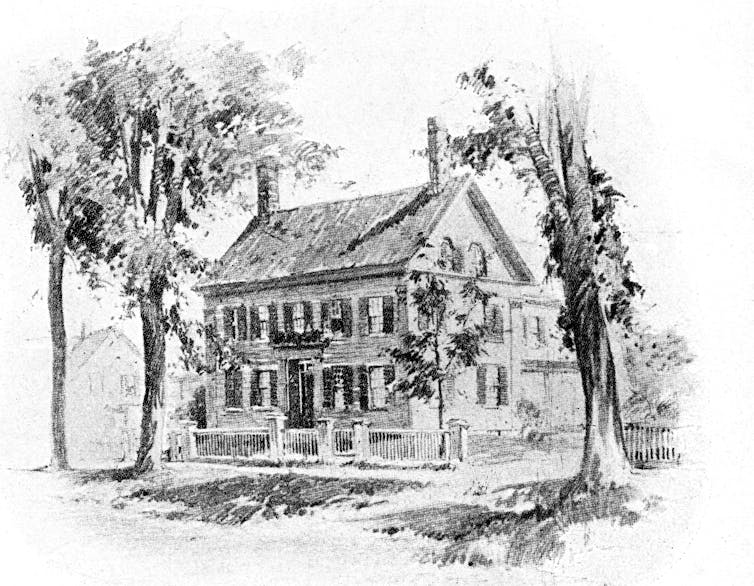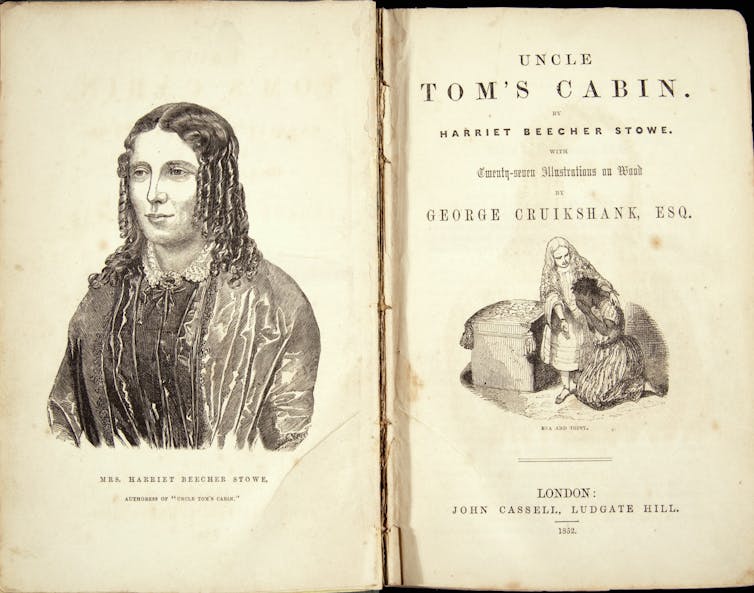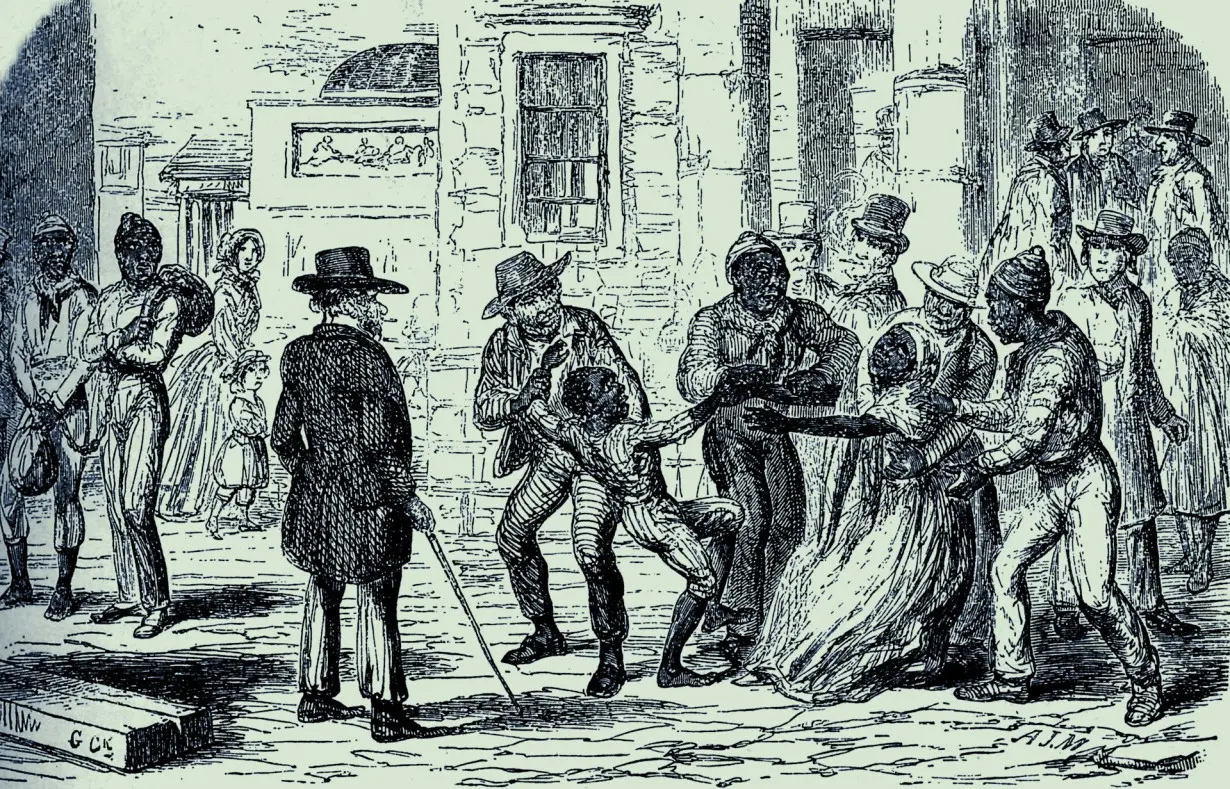In or around 1825, John Andrew Jackson was born enslaved on a plantation in South Carolina and trained to spend his life picking cotton.
But instead of living a life as a slave, he escaped bondage and became an influential anti-slavery lecturer and writer. He also had a key role in Harriet Beecher Stowe’s celebrated novel “Uncle Tom’s Cabin,” which historians have argued helped trigger the Civil War by its depiction of the subhuman treatment afforded Black men and women.
As a scholar of the lives of enslaved people and their writings, I have researched the life of Jackson for years and still remain puzzled by his obscurity from most histories of slavery in America. In my biography of Jackson, “A Plausible Man,” I detail his remarkable life.
North to freedom
In early 1846, Jackson’s wife and daughter were sold to another South Carolina plantation. Heartbroken and furious, he was determined to earn money and buy his family’s freedom. Jackson waited until Christmas Day and took a bold step – he escaped on horseback.
He found work on the docks in Charleston and eventually hid between cotton bales aboard a boat heading to Boston.
Once there, Jackson started speaking at abolitionist meetings across Massachusetts to raise money to free his wife and child. But before he could raise the necessary amount, President Millard Fillmore signed into law the Fugitive Slave Act of 1850, which would impose harsh penalties on anyone who assisted runaways.
Even though Jackson was living in a supposedly free state, he was in terrible danger of being returned to enslavement under the new law. Jackson decided to flee again, this time to Canada.
Along the way, abolitionists directed Jackson to sympathetic homes in Maine.
A chance meeting
One such home belonged to the stuffy Thomas C. Upham, a professor of mental and moral philosophy at Bowdoin College.
He had told his friends that while slavery was a grievous wrong, the Fugitive Slave Act was nonetheless the law and should be obeyed.
But when Jackson knocked on his door, Upham immediately put aside his scruples.
Upham invited him in and offered food and encouragement. Because Upham couldn’t put Jackson up for the night, he directed Jackson to his neighbor, Harriet Beecher Stowe – a friend who had long been frustrated with the otherwise kindly professor’s timid politics.

A drawing of Harriet Beecher Stowe’s home in Brunswick, Maine.
Stowe was a little-known writer at the time, living as a faculty wife of a Bowdoin College professor. When Jackson came to her threshold, she, too, broke the law.
She opened the door and welcomed him in. Jackson entertained her children, told her of his heartbreak and accepted money, food and clothing from her before leaving the next morning.
Although she never used Jackson’s name, she later wrote of this incident, noting that her visitor was “a genuine article from ‘Ole Carliny State’” – a reference to a popular minstrel song that Jackson was to later append to his own memoir.
‘The little woman’
A few weeks later, Stowe began drafting “Uncle Tom’s Cabin.”
It had a familiar scene. The novel’s heroine, Eliza, a Black fugitive, knocks on the door of a U.S. senator who had previously promised to adhere to the fugitive slave laws.
But when faced with a terrorized person at his doorstep, the senator allowed his heart to lead instead of his head. Like the real professor Upham, the fictional senator and his wife defied the law.

An image of abolitionist Harriet Beecher Stowe appears in her novel ‘Uncle Tom’s Cabin,’
Art always arises from a myriad of influences, and other individuals or experiences certainly inspired Stowe’s writing.
But aside from this scene that clearly drew upon Upham’s meeting with Jackson, this encounter took Stowe from the broader debate of anti-slavery politics to the immediacy of direct action.
Published in 1852, “Uncle Tom’s Cabin” galvanized abolitionists across the country and became the second-bestselling book in the U.S. during the 19th century. Only the Bible ranked higher.
A decade later, when Stowe visited the White House in November 1862, President Abraham Lincoln supposedly told her: “So you are the little woman who wrote the book that started this great war.”
A life on the run
While Stowe was drafting her novel, Jackson was crossing the U.S.-Canada border.
He moved from Maine and settled in St. Johns, New Brunswick, for a few years. But his desire to have a broader influence in the anti-slavery movement led him to sail off to Liverpool, England, with an endorsement letter from Stowe herself.
Over the next decade, Jackson lectured across Britain, as many Black abolitionists did, including Frederick Douglass. During this time, Jackson wrote his 1862 memoir, “The Experience of a Slave in South Carolina,” in which he wrote of his encounter with Stowe.
“During my flight from Salem to Canada, I met with a very sincere friend and helper, who gave me a refuge during the night, and set me on my way. Her name was Mrs. Beecher Stowe. She took me in and fed me, and gave me some clothes and five dollars. She also inspected my back, which is covered with scars which I shall carry with me to the grave.”
It was only until after the Civil War ended in 1865 that Jackson sailed back to the U.S. from Britain.
He continued to lecture and raise money, this time for relief supplies for destitute freedmen in South Carolina. He collected money to start an orphan’s home, a church and a home for Black elders without families to care for them.
Few of these projects ever fully materialized, but newspapers and correspondence with government officials document his relentless advocacy.
Jackson’s audacious life ended at some point in the very early 20th century. Before he died, his actions had become legend among the people who knew him in the Black community.
One of his neighbors remembered him with admiration.
In the 1930s, an interviewer asked Jake McLeod, an elderly Black sharecropper, about his memories of Jackson.
“Don’ know how-come he run away,” McLeod said, “but dey didn’t catch up wid him till it was too late.”

Susanna Ashton received funding from The Hutchins Center for African and African American Research at Harvard University and the Gilder Lehrman Institute for the Study of Slavery, Resistance and Abolition at Yale University
Source: The Conversation

 Trump has begun another trade war. Here's a timeline of how we got here
Trump has begun another trade war. Here's a timeline of how we got here
 Canada's leader laments lost friendship with US in town that sheltered stranded Americans after 9/11
Canada's leader laments lost friendship with US in town that sheltered stranded Americans after 9/11
 Chinese EV giant BYD's fourth-quarter profit leaps 73%
Chinese EV giant BYD's fourth-quarter profit leaps 73%
 You're an American in another land? Prepare to talk about the why and how of Trump 2.0
You're an American in another land? Prepare to talk about the why and how of Trump 2.0
 Chalk talk: Star power, top teams and No. 5 seeds headline the women's March Madness Sweet 16
Chalk talk: Star power, top teams and No. 5 seeds headline the women's March Madness Sweet 16
 Purdue returns to Sweet 16 with 76-62 win over McNeese in March Madness
Purdue returns to Sweet 16 with 76-62 win over McNeese in March Madness








